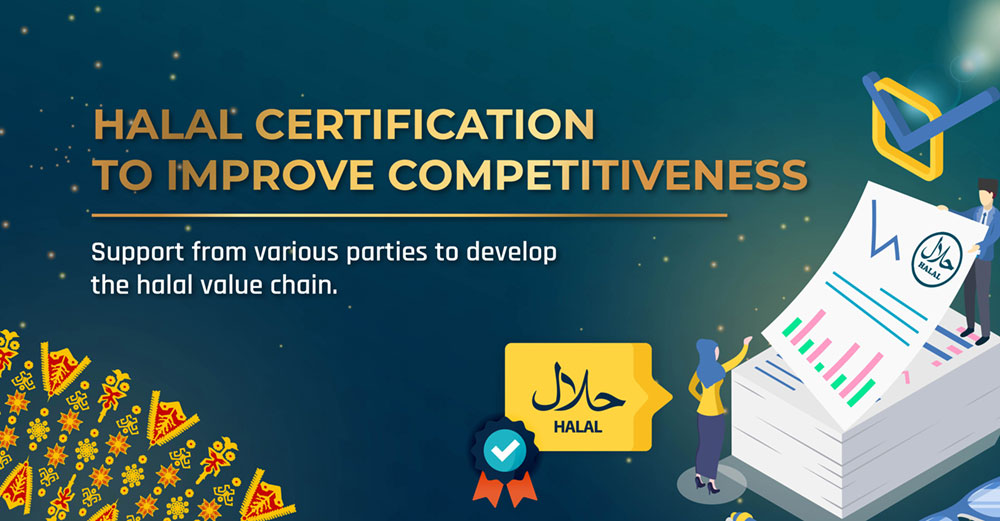Halal Certification to Improve Competitiveness
Support from various parties to develop the halal value chain
A product or service can be said to be halal if it is free from anything harmful, both in terms of health, quality, or function. This concept should be the basis for educating the market and the public about standardized halal principles, namely through certification to create the same halal value in a product or result.
In Indonesia, the explanation regarding halal certification is contained in the RI Law No.33 of 2014 concerning Halal Product Guarantee. Halal certificates are issued by the Halal Product Assurance Agency (Badan Penyelenggara Jaminan Produk Halal-BPJPH) based on a written halal fatwa issued by the Indonesian Ulema Council (Majelis Ulama Indonesia – MUI). With halal certification, it is certain that business actors not only meet the requirements of halal and hygiene, but also increase a positive image about the guarantee of halal products themselves.
The potential benefits of halal certificates once mentioned by the Vice President of the Republic of Indonesia, Ma’ruf Amin. The products made in Indonesia must have a halal certificate in order to be able to compete in the export market of member countries of the Organization of the Islamic Conference (OIC). In addition, halal certification on export products also aims to increase added value and competitiveness in the global market.
The easiest example of halal certification in everyday life is the halal logo on product packaging labels. In Indonesia, products with the halal logo are generally assessed by the MUI, although some are from foreign halal agencies, especially imported products.
Interestingly, it is not only Indonesia and countries with large Muslim populations that have halal certification rules to be applied to various types of food and goods and services. Several non-Muslim majority countries in the world also have such regulations due to the increasing popularity of the local halal lifestyle, as one example is in South Korea.
Halal certificates in South Korea are issued by the Korean Muslim Federation, which is quite time-consuming and costly to administer. In addition to submitting various documents and undergoing inspections of production facilities, a company usually has to pay around 900,000 won (or around Rp11 million) for administrative fees. The validity period of the halal certification must be renewed every 1-2 years, with adjusted additional costs.
How to Manage Halal Certification in Indonesia?
Industry in Indonesia, especially in the food sector, is arguably already quite familiar with halal regulations, which are not only about the origin, but also the series of production and distribution procedures.
However, considering the current industry challenges, halal certification in Indonesia is encouraged to develop its value chain, or commonly known as the halal value chain. The aim is to support the implementation of national development, which is in line with the momentum of the development of high domestic demand for halal products. In addition, domestic production of halal products can also contribute to strengthening the balance of payments, especially if it is able to meet global demand for halal products.
The Indonesian government strongly supports this potential, where its implementation has begun to focus on six clusters or potential industrial sectors for halal products, namely: Halal food, halal tourism, Muslim fashion, media, halal pharmaceuticals and cosmetics, and halal energy sources.
This focus underlies the creation of collaboration between BPJPH, Ministries/Agencies, Local Governments, and other BPJPH Partners, in launching the Free Halal Certification (SEHATI) program to help strengthen Micro and Small Business Actors (UMK). Through this program, regulations are applied that the submission/registration, inspection or audit of products, the determination of halal fatwas, to the issuance of halal certificates are all online based through the Sihalal application.
Quoted from the BPJPH website, the mechanism for submitting an application for halal certification at BPJPH is as follows:
Business owners apply for halal certification to BPJPH.
BPJPH examines application documents for a maximum of 10 working days.
After the documents are declared complete, BPJPH determines the Halal Inspection Agency( Lembaga Pemeriksa Halal-LPH) based on the stipulation of the applicant within a maximum of 5 working days.
LPH conducts inspection and/or testing of product halal for a maximum of 40 to 60 working days.
The results of the inspection/test are then reported by LPH to BPJPH which will then become the material for the MUI fatwa session to determine the halalness of the product with a maximum period of 30 working days.
Based on the determination of the halalness of the product, BPJPH then issues a halal certificate within a maximum of 7 working days.


